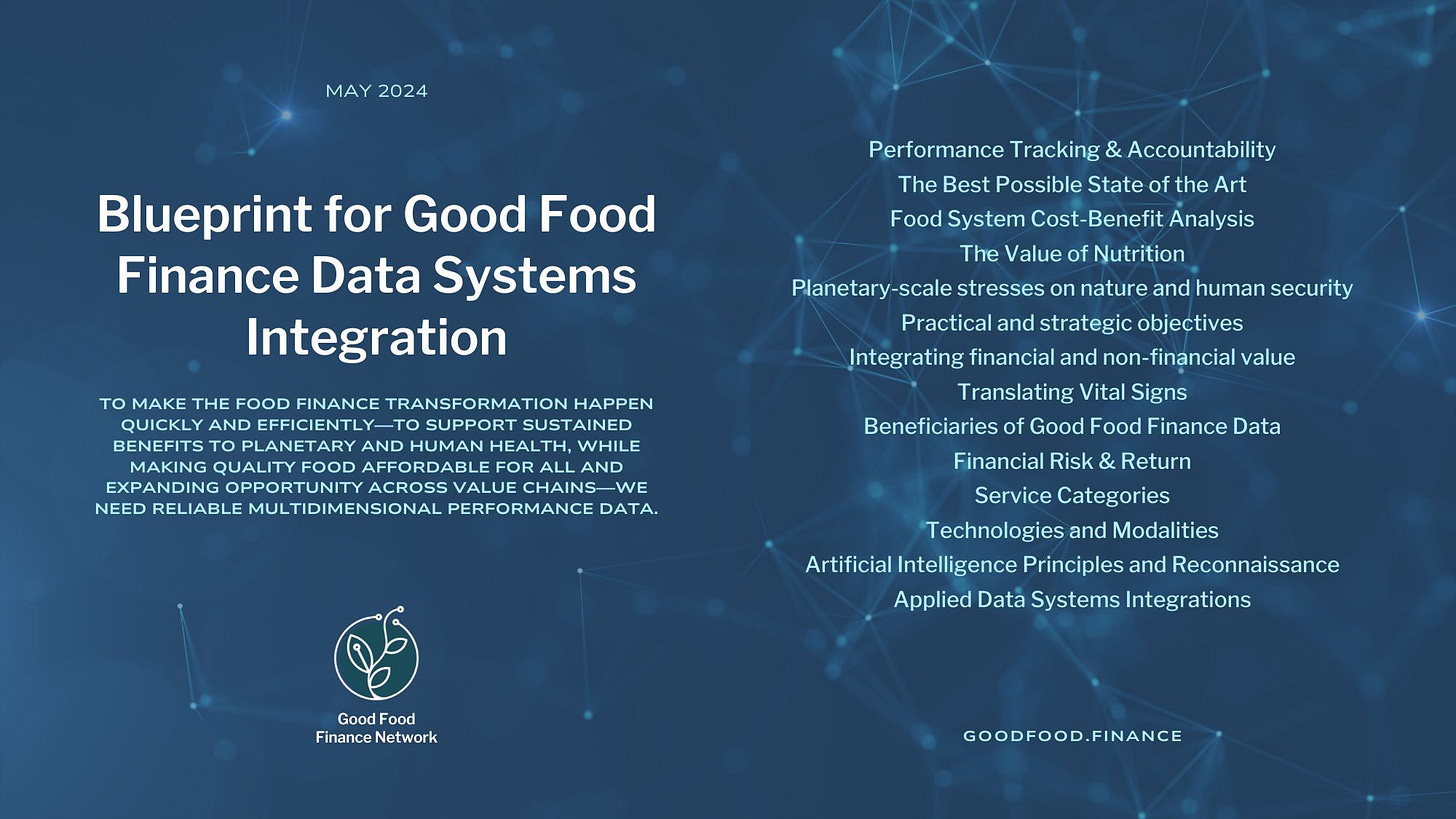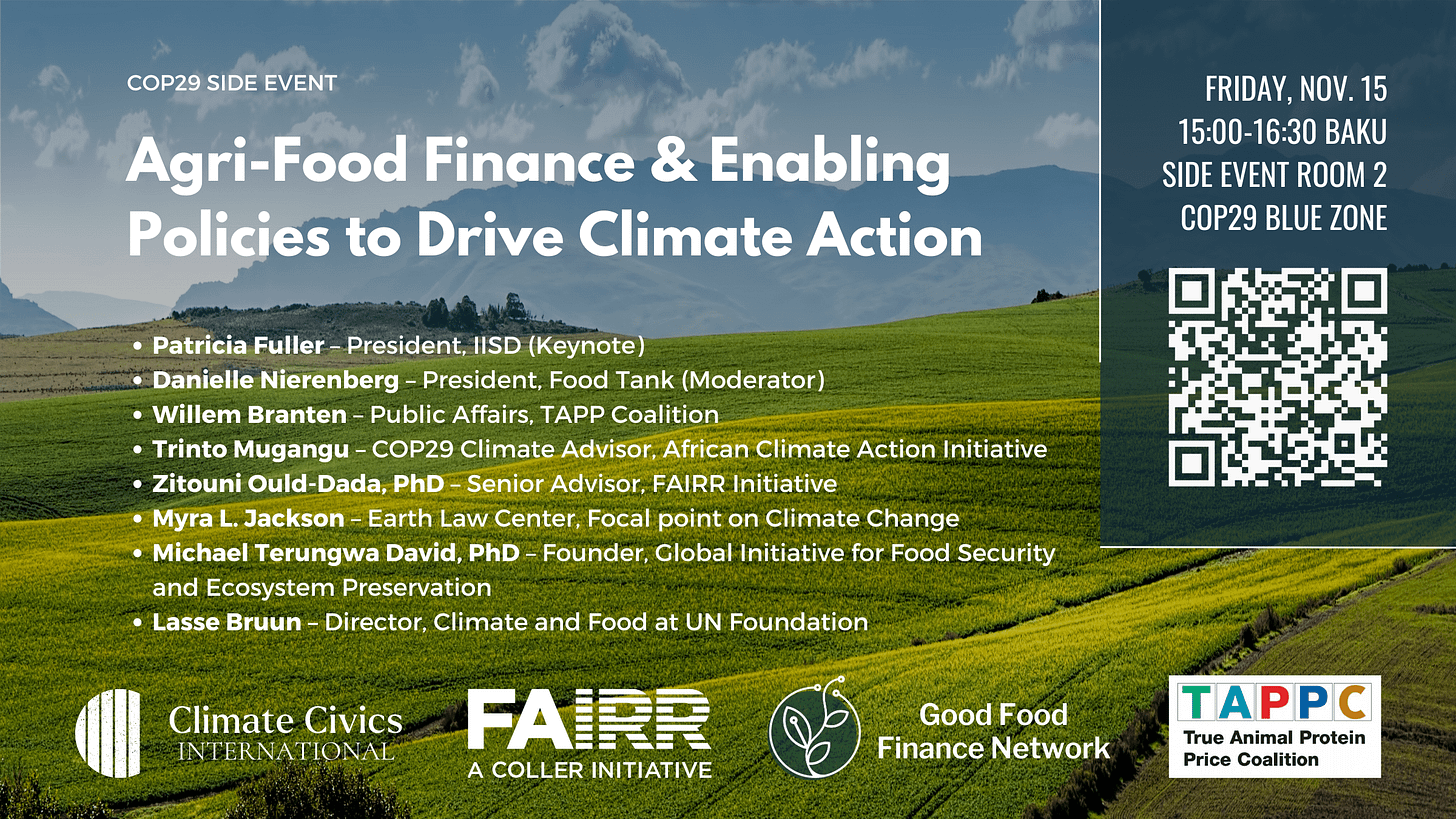The new Good Food Finance newsletter
The Good Food Finance Network is building a new, expanded community, aimed at supporting the development of a co-investment platform for food systems transformation. Follow, and spread the word.
Dear GFFN Community,
We are pleased to share the news that the Good Food Finance Network is now moving our newsletter over to Substack, where we will give you regular updates on the state of Good Food Finance, and activities and publications produced by our team and by our partners.
Since we started the Good Food Finance Network, in September 2021, alongside the United Nations Food Systems Summit, we have asked tough questions, explored the cutting edge of food-related financial architecture, and reported back to our community on opportunities for breakthroughs in policy, incentives, data, and finance mobilization.

Our Good Food Finance Weeks have served as crucial moments of discovery, to share ideas from our workstreams, to dig into the details of reports from our partners, and to share ideas on the best way to unlock new flows of finance for health-building, sustainable food systems.
In 2025, we will hold a series of occasional workshops throughout the year and plan to host a series of Good Food Finance sessions ahead of and during the U.N. General Assembly, in September, the Annual Meetings of the World Bank and International Monetary Fund, in October, and the COP30 U.N. Climate Change negotiations, in November.
Part 1 of our Data Systems Integration Forum will take place on Wednesday; Part 2 will follow in September.
We will hold Part 2 of our Dialogue on Mechanisms for Good Food Finance Mobilization in May.
In June, we will hold informal discussions around the Bonn climate talks and a Summit to Seabed approach to healthy ecosystems.
For more information on upcoming events, check your inbox for these newsletters, or visit our website for more details.
Building the Co-Investment Platform
Last year, we made the decision to re-orient GFFN work toward the central aim of establishing a co-investment platform for food systems transformation. This work is ongoing, and we will provide updates through this newsletter, and in focused discussions and public events.
The first concrete work on establishment of the co-investment platform is about to begin, through a Green Climate Fund grant, administered by the U.N. Food and Agriculture Organization, which will prepare six countries to mobilize funding for food systems-related climate action.
This week: Data Systems Integration Forum
Wednesday, March 26, 2025
The next Good Food Finance virtual meeting will be a Data Systems Integration Forum, focused on activating insights from the Blueprint for Data Systems Integration, which we released last year.
The forum will also begin discussion of a new list of City Food Finance Principles for Building Climate Value, put forward by GFFN partner Climate Civics International and the Climate Value Exchange.
New City Food Finance Principles released by GFFN partner CCI
To bolster cooperative efforts at mobilizing sustainable food systems finance and supporting climate-resilient development, Climate Civics International and the Climate Value Exchange have published six high-level principles to inform Good Food Finance work at city level:
Common Reality – Health-building, nutritious, sustainably produced food should be an affordable, accessible everyday option for all.
Delivering Impact – Cities deliberately play the role of impact investor, to shape healthy, sustainable food environments.
Urban-Rural Feedbacks – Cities work with surrounding rural areas to support convergence of consumption, production, and incentives.
Multilevel Cooperation – Cities engage with regional and national authorities to support enhanced implementation of national climate, food, health, and biodiversity plans.
Co-Investment – Cities engage proactively to shape and mobilize investment partnerships linked to a broader Co-Investment Platform for Food Systems Transformation.
Tracking and Labeling – Cities act as critical intermediaries to support needed data systems integration and multidimensional metrics.
Innovative Collaborative Funding Model de-risks food system investments
The Innovative Collaborative Funding Model (ICFM) is designed to address food security, improve nutritional outcomes, support adoption of climate smart agricultural practices, and enhance sovereign fiscal resilience. A paper published last year outlines the model, along with benefits to key stakeholders and institutions.
By facilitating public-private partnerships through a unique investment deal structure, the ICFM significantly lowers the risks of investing in the food and agriculture sectors while reducing the need for food subsidies. This approach is particularly beneficial for lower- and middle-income countries, offering governments the ability to take equity in projects through public assets rather than cash or local currency.
GFFN partners supported COP29 side event
Last year, during the COP29 round of U.N. Climate Change negotiations in Baku, Azerbaijan, GFFN partners supported an important formal side event inside the negotiation venue, focused on agrifood finance and enabling policies. The event highlighted the COP29 declaration on GHG emission pricing in food systems—which called for “transitioning away from animal protein overconsumption”—and explored ways for Good Food Finance to support enhanced international climate cooperation in line with Article 6.8 of the Paris Agreement.
This is a new way for the GFFN partners to share news and events from the Network and to bring Good Food Finance innovations to a wider audience. The GFFN newsletter is free, so please spread the word to colleagues and partners you believe would be interested.
Our organizing partners and strategic partners have more news to share from recent work and ongoing initiatives; we will catch you up on their work in the next newsletter.
If you have questions or would like to share your organization’s publications, news, and events with the GFFN Secretariat, please write to secretariat@goodfood.finance





